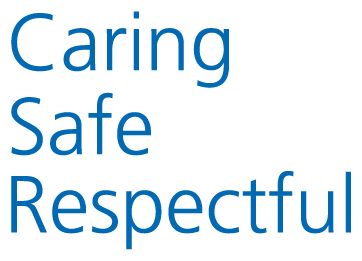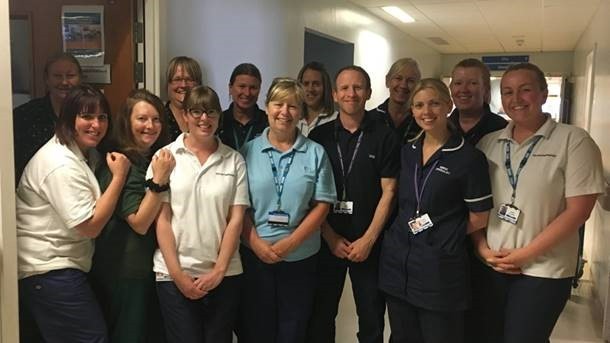What is cardiac rehabilitation?
The Trust has a multi-disciplinary team of nurses, physiotherapist, occupational therapists, clinical psychologists and administrative colleagues. We aim to support patients living with and recovering from their cardiac condition.
Cardiac rehabilitation service
You will be automatically referred to the service following your heart event by the staff on your ward; however you can choose to opt out at any time. You may also be referred to our service if you live in the region, but have had a heart event or alternative treatments (listed below) at a different hospital. In this case the referral should be sent to us on discharge.
Patients from out of the local area are referred back to their local Cardiac Rehabilitation Team
We are able to include the following patients:
- Myocardial Infarct (MI) (Heart attack)
- Revascularisation procedures including angioplasty (stenting PCI or ballooning), coronary artery bypass surgery (CABG)
- Heart valve repairs / replacements / TAVI procedure
- Heart Transplant and Ventricular Assisted Devices (VADS)
- Heart Failure
The Cardiac Rehabilitation Team will phone you within 2 weeks of your discharge. We will ensure that you understand your heart event and talk you through your recovery period, reiterating the advice which is given within the booklet you should have received from the ward / pre admission clinic.
For a copy of the booklet, please see below:
- Cardiac Rehabilitation
- Advice for patients having open heart surgery
- Transcatheter Aortic Valve Insertion (TAVI)
We will also conduct a brief and informal assessment of your cardiac risk factors at this time (such as if you smoke, your usual exercise levels, nutritional intake etc.) and give you some basic advice about how best to manage these in the early days. We will also give you some guidance as to how to gradually increase your general activity in order to help your heart recover.
During the call, you will be invited to attend an initial assessment appointment if you wish to be enrolled onto the Cardiac Rehab programme.
This assessment appointment will be via video ‘Attend Anywhere’ or telephone consultation. The appointment will include a discussion about your event and recovery, identifying your personal cardiac risk factors and planning for the future including returning to ‘normal’ and secondary prevention. Ideally this appointment will be arranged for between 2 and 6 weeks after your heart event (depending on the nature of the event i.e. Surgery, heart attack) however there may be a waiting list in the short term.
This assessment will help us to jointly establish your goals and formulate a plan to achieve them. This plan might include:
- An 8 week graded activity plan
- An 8 week education/ advice online programme
- Enrolment to myHeart app
- Weekly/fortnightly telephone support from the Team
- 1:1 emotional support with an Occupational Therapist
- Referral to Clinical Psychology services
You will be offered to attend the 8 week online education programme. The sessions are for approx. 1 hour once a week. The sessions are group based and include people with various heart conditions.
Education Sessions
The sessions are interactive and aim to provide education as well as allowing you to ask any questions that you may have.
Topics include:
- Anatomy and Physiology of the Heart (speaker: Cardiac Rehab Specialist Nurse) – an explanation of how to heart works and heart conditions including treatments and investigations.
- Exercise (speaker: Physiotherapist) – a discussion around how exercise improves health outcomes and how it can help with heart conditions and associated symptoms, an explanation of the difference between activity and exercise (and why this matters) and information about the latest recommendations for safe exercise to achieve optimum health benefits.
- Cardiovascular Risk Factors (speaker: Cardiac Rehab Specialist Nurse) – discussion about the modifiable and non-modifiable contributory risk factors for coronary artery disease (CAD). Information and practical advice about primary prevention (preventing the onset of CAD) and secondary prevention (preventing deterioration of CAD and reducing the likelihood of requiring further invasive intervention)
- Healthy Eating (speaker: Cardiac Rehab) – discussion about the principles of healthy eating in the context of cardiovascular health.
- Stress (speaker: Occupational therapist) – We will identify the signs and symptoms of stress as well as the physical, emotional and behavioural impact on our health and wellbeing. We will look at practical ways that can help to reduce feelings of stress and increase feelings of wellbeing.
- Sleep and How to Manage Fatigue (speaker: Occupational therapist) – Discussion around why we need sleep, what can affect the quality of our sleep and practical ways to improve sleep. We will also look at ways of managing fatigue identifying common barriers and looking at useful ways to improve quality of life.
- Medication (speaker: Cardiac Rehab Nurse Specialist) – a discussion around medications and how they work, potential side effects and why it is necessary to take heart medications.
- Heart to Heart –Managing your emotional health and wellbeing (speaker: Occupational therapist) – In this session we take a look at the thoughts and feelings commonly experienced after a cardiac event. We will consider ways to improve wellbeing and look at the impact that cardiac events can have on relationships.
You may be referred to this service by your Consultant, Heart Failure Nurse/Matron or GP. The aim of this service is to support you with the long term self-management of your heart failure condition.
Facebook Page
We also have a Facebook page – Cardiac Rehabilitation Blackpool Teaching Hospitals
Helpful Links and Contact details
- British Heart Foundation
- Cardiomyopathy UK
- Pumping Marvellous
- Beat SCAD (Spontaneous Coronary Artery Dissection)




